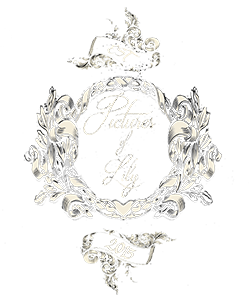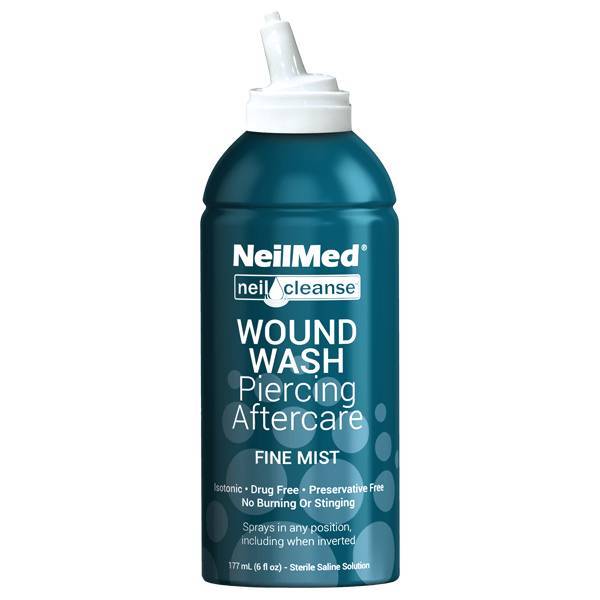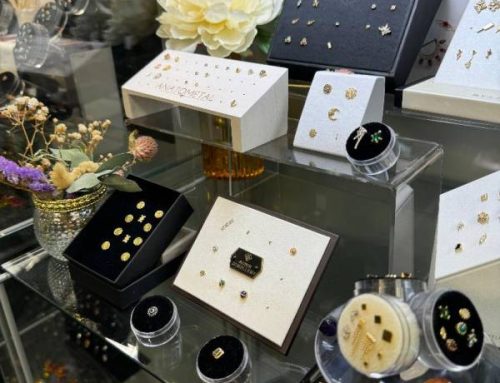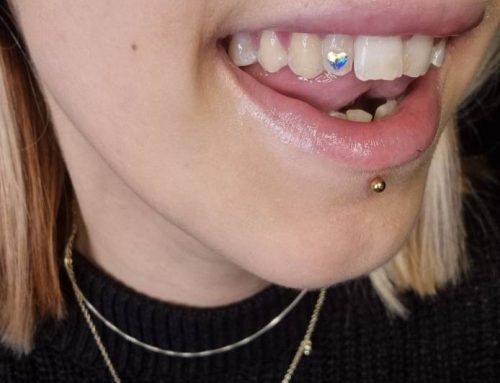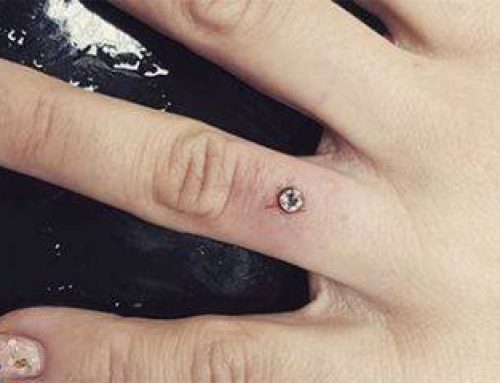Having a new piercing involves breaking the skins surface, this means that your fresh piercing must be cared for properly and you should follow the professional advice that is given to you in order for your piercing to heal the best that it can. It is normal for your piercing to be sore, tender, possibly slightly bruised, swollen and crusty; this is your body’s natural reaction to having a hole put in it and a foreign object placed there. Healing can be affected by many factors including hormonal changes, illness, weather, altitude etc. If you have any concerns about the healing of your piercing please do not hesitate to contact us.
Cleaning Your Piercing
Ears, nose, navel, nipples, surface and dermals:
- Make sure your hands are clean
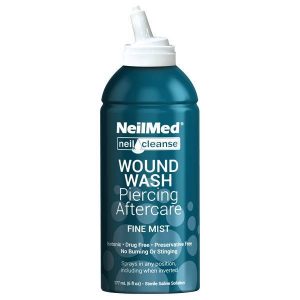
- Clean your piercing twice a day for two weeks only. You do not need to do it more than this or your piercing may become irritated
- Spray the Neilmed cleaning solution (available from us) directly onto your piercing. Do not use cotton buds or cotton wool to clean the area
- Gently pat the area dry with clean kitchen roll or gauze, ensuring not to knock your piercing. Then dry thoroughly with a hair dryer on a cool setting to ensure your piercing is completely dry
- You do not need to over clean your piercing; they don’t like to be faffed with!
- After two weeks, just plain water will help to wash away any crusty bits and do continue drying off your piercing with the hairdryer for some months after showering etc.
Oral piercings (lip, tongue, cheeks etc):
- Rinse your mouth twice a day for two weeks using an antibacterial, alcohol-free, diluted mouthwash. Avoid toothpastes or mouthwashes that are extra minty of for teeth whitening
- If you are using facial washes, make sure it is mild and not too harsh as to cause irritation
- Make sure you do not get make-up in your piercing
- When showering rinse the outside of your piercing with plain water (lip or cheeks), or Neilmed cleaning spray (available from us).
- If you are a smoker make sure you rinse your mouth with water or diluted mouthwash after you have had a cigarette
- When out and about carry a bottle of plain water with you and swill out your mouth after eating
- Avoid alcohol and spicy foods, at least for the first two weeks
- Avoid giving oral sex for at least two weeks
Genital piercings:
- Clean your piercing twice a day for two weeks only, using Neilmed aftercare spray available from us. You do not need to do it more than this.
- Spray the Neilmed solution directly onto your piercing. Do not use cotton buds or cotton wool to clean the area.
- Make sure you drink plenty of water to dilute your urine or it may sting.
- Avoid sex for the time advised. After this make sure your piercing does not come into contact with bodily fluids.
- When you begin having intercourse make sure it is a position that will not interfere with your piercing e.g. missionary may cause rubbing and catching.
It is normal for piercing to bleed at first and for this to occasionally reoccur during the first few days, it’s also normal that your piercing will get crust on it, but it’s really important not to pick this off. Swelling, tenderness and sometimes bruising is also a normal reaction for your body to have after a piercing.
Do not twist or turn your new piercing, this will actually do more harm than good
Never clean your piercing with hydrogen peroxide, alcohol, Dettol , TCP, surgical spirits or anything other than what you have been advised to use. These are too harsh and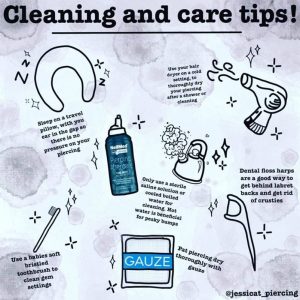 will cause irritation; your body has an open wound and is trying to accept a foreign object.
will cause irritation; your body has an open wound and is trying to accept a foreign object.
Avoid swimming for the first couple of weeks as the water may irritate your piercing, When you do go swimming you need to flush the area with clean saline solution and dry the area properly.
Do not go to bed with wet hair if you have had an ear piercing, as moisture will irritate your piercing.
A healthy immune system is vital for the healing of your piercing, so a balanced diet is essential and drink plenty of water.
It’s important to maintain good personal hygiene and to wash clothing and bedding regularly.
Your initial jewellery is the size your anatomy requires, but also in some cases longer to allow for any swelling. Do not change your jewellery sooner than advised as this can lead to problems, you must come to us for your jewellery changes, or ask us who we recommend if you don’t live locally.
We do not advise buying jewellery online or from certain high street retailers, as the materials may be sub-standard and of the wrong size, which will lead to problems. We would only advise using high quality, hand-polished, implant grade titanium or gold (14K or 18K and not plated). Check out our blog explaining the importance of using good quality jewellery The Importance of Using Good Quality Jewellery
Avoid catching your piercing or wearing clothing that will catch or rub as this can lead to migration and irritation.
Do not panic if you have intermittent bleeding, this is normal for piercings. It is really important to make sure you come back for your check up appointment and free change down (piercing dependent); getting correctly fitted jewellery will really help your piercing heal better. Some piercings are prone to getting little lumps and bumps on them, so if you get a lump or bump pop into the studio, or message us and we can advise you on how to best deal with this (also refer to our lumps and bumps blog Lumps & Bumps on Piercings). Infection is extremely rare, but if you suspect that your piercing is infected please come to see us first and we can then advise you on the best action to take.
